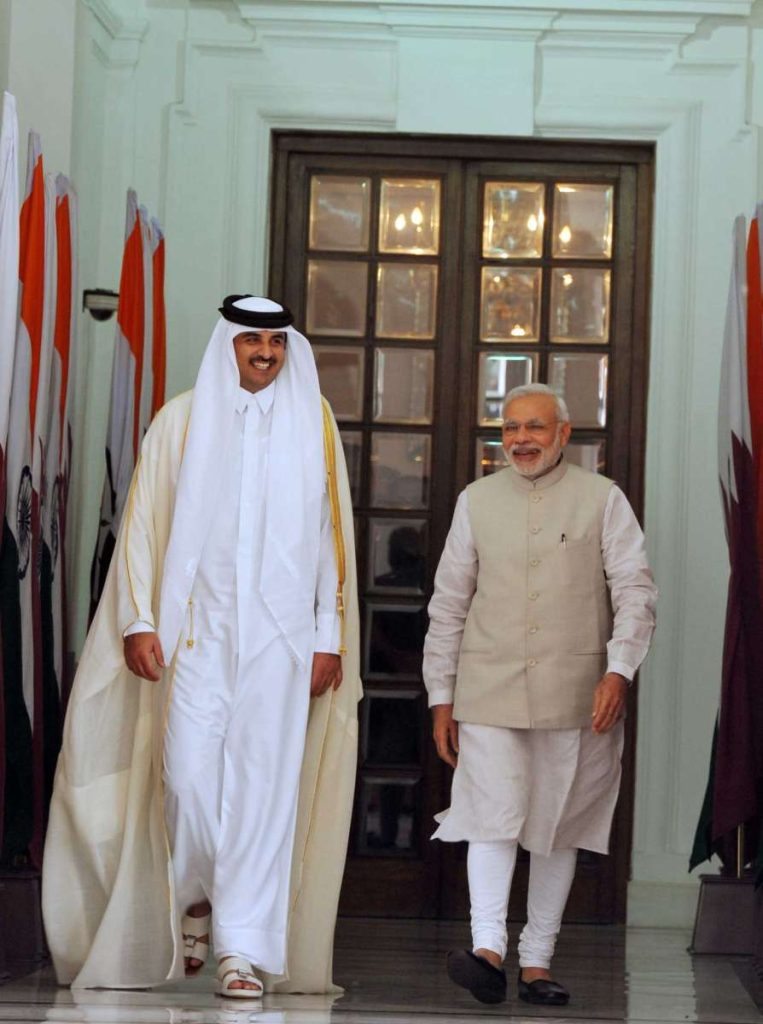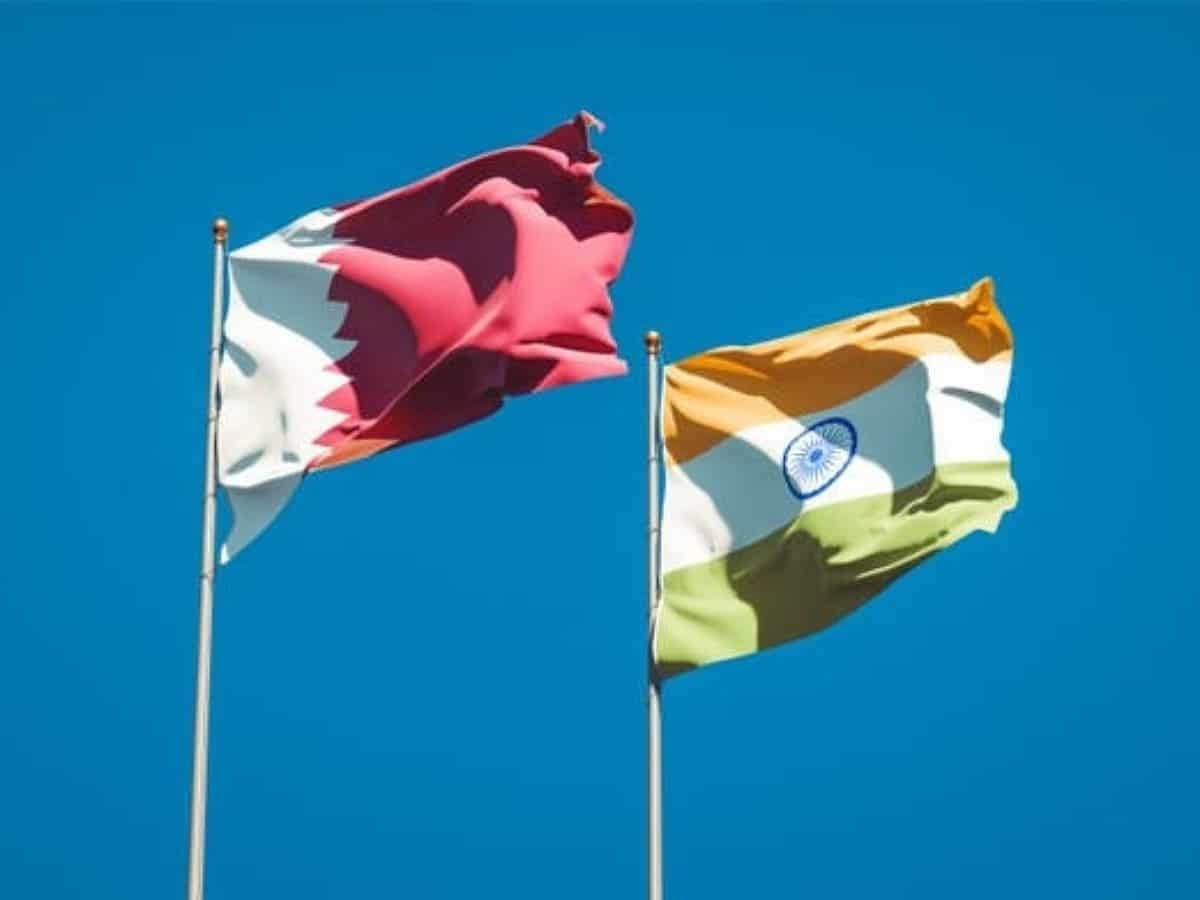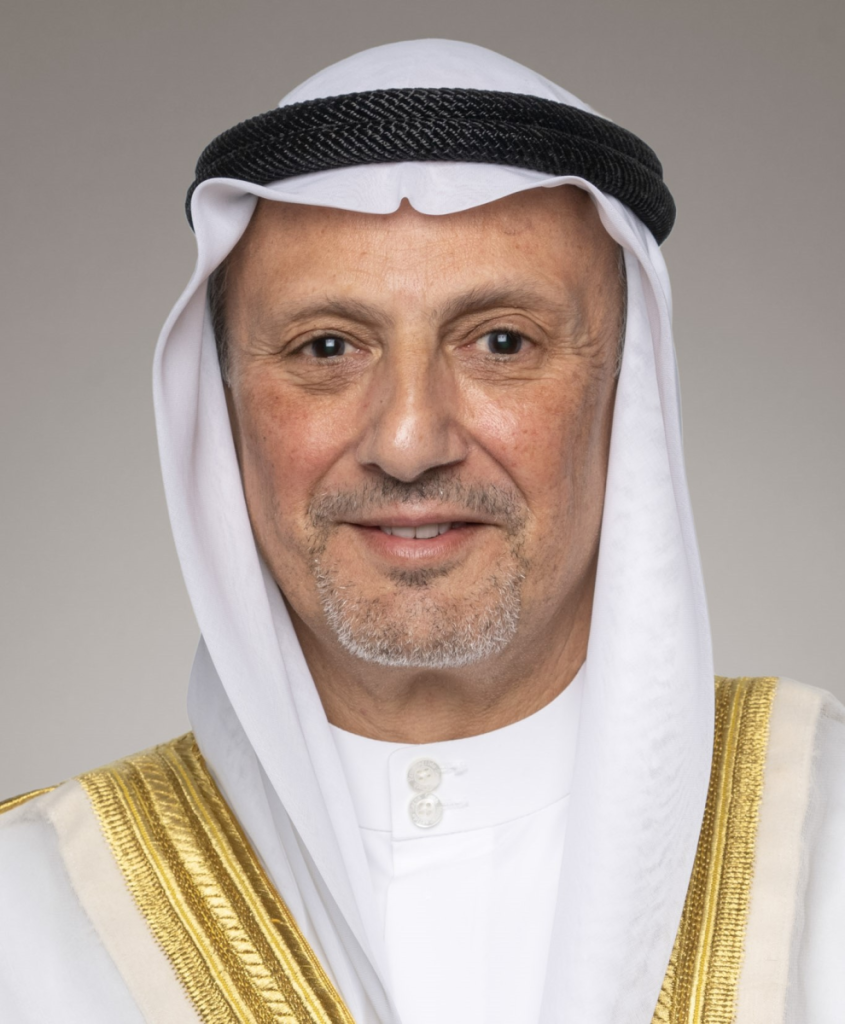Capital Punishment to 8 Indian Navy personnel sours 50 years of India-Qatar Diplomatic ties, writes Shubhda Chaudhary
In 2023, India and Qatar were set to celebrate 50 years of their diplomatic relationship. But on October 26, the Court of First Instance of Qatar – a collegiate court that hears civil (Court of First Instance) and criminal cases (Correctional Court) – finally passed a death sentence on 8 Indian retired navy personnel, who were working as employees of Al Dahra company. “We are deeply shocked by the verdict of death penalty and are awaiting the detailed judgement. We are in touch with the family members and the legal team, and we are exploring all legal options,” stated the Press Release issued by Indian Ministry of External Affairs. Due to the confidential nature of proceedings of this case, it would not be appropriate to make any further comment at this juncture, stated the press release.
The retired navy personnel on death row are: 1. Capt Navtej Singh Gill 2. Capt Birendra Kumar Verma 3. Capt Saurabh Vasisht 4. Cdr Amit Nagpal 5. Cdr Purnendu Tiwari 6. Cdr Sugunakar Pakala 7. Cdr Sanjeev Gupta 8. Sailor Ragesh.
Other 75 Indian nationals who also worked with Al Dahra were informed that their last day of employment was on 31 May. They were asked to leave Qatar as their visas have expired. According to the terms of their contract, a severance package would be paid to them. The CEO of Al Dahra, Khamis Al-Ajmi was later released.
According to the investigations done by The Sunday Guardian, the CEO of Dahra Global, Retired Omani Air Force Squadron Leader Khamis Al Ajmi with the help of two French nationals has set up a new company called Advanced Services and Maintenance. This company is in the process of taking over all the assets owned by Dahra, including office buildings, contracts and non-Indian employees
Arbitrary solitary confinement of former Indian Navy officers, by Qatar, when “repatriation” would have sufficed, is inappropriate for a “friendly” neighbour. Perhaps time to review IN-Qatari Navy relations & joint naval exercise Zair-al-Bahr “ tweeted Former navy chief Admiral Arun Prakash on November 4, 2022.
It must be noted that Captain Purnendu Tiwari, who served as the Managing Director of the company, was honoured with the Pravasi Bharatiya Samman award in 2019 for his contributions to strengthening the bilateral relationship between India and Qatar. He was the only person from the Indian armed forces who had received this prestigious award. His contributions were acknowledged in Doha by then Indian Ambassador P Kumaran, along with a former head of the Qatar defence forces’ International Military Cooperation. Sugunakar, on the other hand, worked as additional general manager in charge of submarine repairs at Hindustan Shipyard in Visakhapatnam from 2016 to 2018, according to his LinkedIn profile..
Qatar’s allegation
The eight former Indian navy personnel are retired veterans, who have been accused of spying for Israel on Qatar’s secretive programme to obtain high-tech, Italian made submarines. Israel, as yet, has not commented on the issue. These submarines, which would be coated with metamaterials making detection difficult. Qatar aims to procure U212 advanced submarines which can avoid radar detection. After this procurement, Qatar will become the second country after Iran to operate submarines in the Arabian Gulf. This submarine project is part of an agreement between Qatar and Italian shipbuilding company Fincantieri that also includes naval base construction and supply of naval vessels. It is essential to highlight that Qatar and Italy signed a five-billion-euro defence deal in 2017.
Fincantieri, an Italy-based company that specialises in warships, oil tankers, submarine platform supply vessels, had signed a Memorandum of Understanding with President of Barzan Holding, Nasser Al Naimi, on behalf of Qatar’s Ministry of Defence in 2020. Though, Maziar Motamedi, wrote in Al Jazeera on May 2, 2023, stating, “A Fincantieri representative told Al Jazeera that the company currently has no existing contracts for submarines with Qatar, but continues work on finishing seven surface vessels – including four corvettes, one amphibious vessel and two patrol vessels – based on a 2016 agreement with the Qatari Ministry of Defence.”
Nevertheless, the wider project that involved construction of a naval base as well as maintenance of the military fleet, application of cyber-security and digital radar were also included. Qatar’s ambition to acquire submarines and hi-technology in the Persian Gulf, signifies its intention to be a regional security player and to move beyond the patronising remark of its ‘punching above its weight. ‘This move, undoubtedly, would challenge the military status-quo in the region, especially Israel’s military and diplomatic supremacy.
While Commenting on the issue to Blitz, an independent newspaper, a retired officer of a Western intelligence agency told Tajul Islam, the correspondent, that the Israeli Mossad has paid “more or less an amount equivalent to US$1 million to each of these arrested personnel of the Indian Navy”. It further alleged that by foiling the Israeli Mossad’s plot, Qatari intelligence agency Qatar State Security has shown its brilliant performance, as the matter is of highest national interest to the State of Qatar. The source further said, Israeli Mossad has also been trying to infiltrate within other sensitive establishments in Qatar, including its media organizations by recruiting Indian nationals as its moles or agents. Some of these Israeli moles have connections with Qatari defence officers as well as those working at royal palaces in different positions.
How the story unfolded
On the night of August 30, 2022, eight Indian navy personnel (who had been working at Al Dahra for four to six years) were arrested by the State Security Bureau, the Qatari intelligence agency. The Qatar State Security had claimed to have intercepted electronic communications establishing that the eight naval officers were spying on the submarine programme for Israel. The purported evidence has not been shared with India.
It was only in mid-September 2022 when the Indian Embassy first learnt about the arrests. On September 30, the arrested navy personnel were allowed a brief telephonic contact with their respective family members. On October 3, the first consular access was provided to Indian embassy. Ambassador Deepak Mitttal, who was then posted in Doha, along with his deputy had met the navy personnel of October 1 – before their hearing which was to take place of October 3. Later, Joint Secretary (Gulf) Ministry of External Affairs (MEA) Vipul presented his credentials as Ambassador of India to Emir of the State of Qatar H.H. Sheikh Tamim bin Hamad Al Thani on 17th August 2023. His posting was aimed to ease-off the escalating tensions between India and Qatar and was considered a hope for repatriation. Even Vice-President Jagdeep Dhankhar’s visit to Doha in November 2022, to represent India at the inauguration of the FIFA World Cup was a subtle diplomatic request for repatriation.

The progress of the trial
The first hearing in their trial was held on March 29. No evidence or charges were informed to the family members of the navy veterans, by either Indian or Qatari officials. On April 6, the MEA stated that Indian government would provide legal assistance to the men. During the first six months of this year, India’s mission in Qatar experienced an exponential 11,254% rise in expenditure for legal assistance compared to last year, presumably linked to the ongoing case of eight former Indian naval officers who have been detained on unspecified charges for the past 11 months, according to a report by The Wire.
The context of espionage: The unknown ‘known’ facts
The eight navy personnel were working at Dahra Global Technologies and Consultancy Services. The company, owned by Omani national Khamis al-Ajm, who is also a retired squadron leader of the Royal Omani Air Force – provides support in Aerospace, Security, Defence, Information Technology & Communications sectors. The previous website of the company stated that it provided training, logistics, and maintenance services to the Qatari Emiri Naval Force (QENF). After the arrests, the new website which has been renamed as Dahra Engineering & Security Services L.L.C and it no longer mentions this connection. The previously featured certificates from erstwhile Indian Ambassadors Kumaran and Mittal are not available.
Qatari’s ignorance of International Law
“Shocking! What espionage would ex-Indian navy officers conduct & for whom? Qatar has a US airbase & Americans ain’t complaining. Is the allegation of info passed to Qatar’s Gulf rivals? India should’ve forcefully intervened at the start by insisting on transparent trial.” Tweeted retired Indian Ambassador K.C.Singh.
Undoubtedly, the Qatari authorities are ignoring international law by failing to immediately inform embassies when their citizens are arrested. Data revealed by Mapping Death Row, that between 2016 and 2021, at least 21 people were under sentence of death in Qatar. Of the 21, only three cases involved Qatari nationals and only one involved a woman (who was accused of murder). The remaining 18 were made up of foreign nationals: seven from India, two from Nepal, five from Bangladesh, one Tunisian and three Asians of unknown nationality. Qatar’s justice system has been consistently criticised by the UN and Amnesty International for inadequate access to legal counsel in a language the defendant understands, restrictions on the ability of defendants to address the courts, trials in absentia, and allegations of forced confessions obtained through torture, particularly of non-Qatari nationals.
Impact of India-Qatar bilateral relations
After the India-Canada diplomatic row, it would be difficult for New Delhi’s political echelons to navigate this emerging crisis, especially in the fragile context of Israel-Hamas conflict. Both India and Qatar have enjoyed symmetrical bilateral ties. In November 2008, when Indian PM Manmohan Singh visited Qatar, he became the first Indian PM to do so, marking a turning point. In 2015, the Qatari Emir, Sheikh Tamim Bin Hamad Al Thani, visited and Indian Prime Minister Narendra Modi reciprocated with his visit to Qatar in 2016.
Indian External Affairs Minister Dr. S. Jaishankar and NSA Ajit Doval have visited Qatar multiple times. Currently, 21% of the Qatari population amounts to 7,00,000 Indian citizens. India ranks amongst the top four export destinations for Qatar. The bilateral ties between the two countries amounts to US$15 billion – primarily including Liquified Petroleum Gas and Liquified Natural Gas. Along with export, defence cooperation is also a significant element in the bilateral ties. In 2008, PM Manmohan Singh signed the maritime India- Qatar Defence Cooperation Agreement which was extended for 5 more years till 2018. The agreement included provisions for the training of the QENF by India and mutual visits, underlining the significance of defence cooperation in the relationship.
When the neighbouring countries like Saudi Arabia, Bahrain, Egypt, and UAE had boycotted Qatar in 2017, India started a new direct maritime line to Qatar to ensure its food security. The line links Hamad Port in Qatar with Mundra (Gujarat) and Nhava Sheva Port (Maharashtra) in India, the Minister of Transport and Communications (Motoc).
“One cannot help but notice the timing is this in wake of Hamas – Israel conflict and India’s open and strong pro-Israel stand. The top leadership of Hamas lives in Qatar and enjoys a healthy relationship with the government,” tweeted Maj Manik M Jolly, a decorated Indian Army veteran who served both in the Infantry and with the Military Intelligence.
“Qatar, which the U.S. last year designated as its “Major Non-NATO Ally,” played a key role in the US-Taliban accord that eventually returned that terrorist militia to power in Afghanistan. Israel allowed Qatar to transfer over $1.8 billion to Hamas since 2012,” tweeted Brahma Chellaney, a professor of strategic studies at the Centre for Policy Research in New Delhi
India’s stand in the fallout
The first challenge to India-Qatar relations came in July 2022 when BJP Spokesperson Nupur Sharma (37-year-old lawyer) made controversial references to the Prophet. Qatar was the first country to demand a “public apology’ from India. “Allowing such Islamophobic remarks to continue without punishment, constitutes a grave danger to the protection of human rights and may lead to further prejudice and marginalisation, which will create a cycle of violence and hate,” Qatar’s ministry of foreign affairs said. As a result, Sharma was called a ‘fringe element’, as then Indian Ambassador Deepak Mittal Mittal when he was summoned to the Foreign Office for a dressing down. The fallout was contained by sacking Sharma, but its repercussions remained.
In the context of the arrest of the 8 navy personnel, India chose not to “put pressure on Qatar” or interfere but would keeping a “close watch”, on the Qatari legal process that is currently underway for the eight detained former Indian Navy personnel in the Gulf country, Official Spokesperson of the Ministry of External Affairs (MEA) Arindam Bagchi said on 6th April 2023.
To this, Congress’ Communications Chief Jairam Ramesh immediately adopted a very strict stance by asking “Is the Prime Minister reluctant to put pressure on Qatar because its sovereign wealth fund is a major investor in Adani Electricity in Mumbai? Is that why the relatives of the imprisoned ex-Naval personnel are running from pillar to post for answers?” He was referring to the 2019 report of Qatar Investment Authority agreeing to buy a 25.1% stake in Adani Electricity Mumbai Ltd, which distributes power to three million consumers in Mumbai — for ₹3,200 crore. “Why is the Indian Government still unable to either ascertain the facts of the case or to reassure the ex-Naval personnel and their families that justice will be done?” he had further asked.
Currently, there are more than 600 other Indian prisoners languishing in prisons in Qatar. Out of these 600 Indian prisoners in Qatar, 522 of them have been convicted, while 113 are still under trial. A total of 4,649 Indians out of the 8,258 Indian prisoners are lodged in the Gulf countries of Bahrain, Qatar, United Arab Emirates, Kuwait, Saudi Arabia and Oman.
Most of these prisoners are charged with cases like murder, illegal stay, financial fraud, drug trafficking, etc.
What lies ahead?
Firstly, in 2015, during Qatari Emir Sheikh Tamim bin Hamad Al Thani’s visit to India, both sides had signed multiple agreements, including one on prisoner repatriation. The pact allowed citizens of India and Qatar who had been convicted of crimes to be extradited to their home country to serve the remainder of their prison sentence. India should explore this provision to grant relief to the eight navy personnel currently sentenced to capital punishment in Qatar. Under the constitution, the emir has the power to pardon or commute sentences.
Secondly, as the sentence has been given by the Court of First Instance of Qatar, its decision can be repealed to the Court of Cassation, the highest court in the Qatari judicial system. Thirdly, the methodology followed to free Omani national Khamis al-Ajm can be emulated in the case of Indian veterans, too. Nevertheless, it would be essential for MEA to investigate what electronic equipment were seized from Indian nationals, who ‘framed’ them and why, as well as how this fallout would have further implications on India-Qatar relations.













